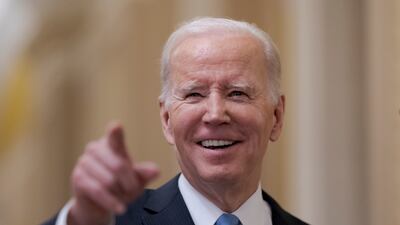US President Joe Biden on Thursday proposed an increase in defence spending as he unveiled his budget plans for the coming year, but Republicans said the extra funding does not go far enough.
America already spends more on defence than the next nine countries combined, and under Mr Biden's proposal for fiscal year 2024, the Pentagon would get $842 billion — a $26 billion (3.2 per cent) increase from 2023's record-breaking defence budget.
The defence spending would include $9.1 billion for the Pacific Deterrence Initiative, which is geared towards boosting Washington's regional competitiveness against an emboldened Beijing, and $37.7 billion for modernising US nuclear capabilities.
Mr Biden's budget mainly focuses on domestic spending, but tucked away in the proposal is an emphasis on “de-escalation” in the Middle East and a continuing focus on countering China.
US Secretary of State Antony Blinken said the budget would “make it possible for us to continue to promote US national interests, lead the world in tackling global challenges and continue support for the people of Ukraine”.
Under the previous budget, Mr Biden signed into law a record $858 billion in defence spending, $45 billion more than he had asked for.
Critics argued that Mr Biden's latest proposal would amount to a defence cut, once inflation is considered.
Senate Armed Services Committee ranking member Roger Wicker, who has previously endorsed “sustained” growth of the national defence budget at a minimum rate of 5 per cent above inflation, called the proposal “woefully inadequate”.
“This defence budget is a serious indication of President Biden’s failure to prioritise national security,” the Republican said in a statement.
US Special Operations Commander Gen Bryan Fenton spoke at a Senate Armed Services Committee hearing this week about defence spending in the 2024 budget.
He told the committee that Washington's defence apparatus is operating in “an era where the strategic competitors … seek to reshape the rules-based international order”.
Gen Fenton added that counter-terrorism and anti-ISIS campaigns in the Middle East remain “a high priority” and that the past year's operations have been vigorous.
“It's been an extremely challenging year for these extremist operations with a number of operations we put together including in Syria,” he added.
Christopher Maier, US assistant secretary of defence for special operations and low-intensity conflict, said that operations “are probably on a good pathway in terms of funding” but that global inflation has presented a “challenge”.
“If our budget is flat, that reduces our buying power.”
Outside of defence spending, Mr Biden's budget seeks to launch a new Middle East and North Africa Opportunity Fund “to support priorities for US engagement and respond to prospects for de-escalation and peace across the region”.
It allocates about $6.4 billion for Washington's regional partners, including $3.3 billion to the US-Israel Memorandum of Understanding; $1.45 billion to Jordan; $1.4 billion to “support the US strategic partnership with Egypt”; and $259 million for “critical assistance” for Palestinians in the West Bank and Gaza.
Israel, Egypt and Jordan usually constitute the majority of Washington's Middle East funding requests, according to the Congressional Research Service.
Given the plan's more concentrated focus on the Indo-Pacific and Russia, analysts say it continues a trend of Washington's pivot away from the region.
The FY 2024 budget "does signal that the Middle East is taking up a lower rank on the Pentagon's priority list and we should not be surprised about further draw-down efforts in the region," Caroline Rose, Portfolio Director and Head of the Power Vacuums programme at the New Lines Institute, told The National.
Mr Biden's proposal resurrects many items stripped from last year's budget plan, including plans to cut the nation's deficit by nearly $3 trillion over 10 years by raising taxes on those earning more than $400,000 a year and ending corporate tax breaks enacted in 2017 under then-president Donald Trump.
Republicans won control of the House of Representatives in November's midterm elections and House Speaker Kevin McCarthy has threatened to block an increase in the $31.4 trillion limit on federal borrowing unless Mr Biden agrees to trim spending.
It also proposes raising taxes on the wealthy and large corporations, one official said, and “tackles wasteful special interest giveaways”.
Republicans say Mr Biden's spending during his first two years in office drove inflation to near 40-year highs last summer. They are already readying $150 billion in cuts to non-defence discretionary programmes that they say would save $1.5 trillion over a decade.
In February, the non-partisan Congressional Budget Office estimated that the national debt held by the public would grow by more than $20 trillion over the next decade.
The publicly held debt would be equal to 118 per cent of US gross domestic product, up from 98 per cent this year.

